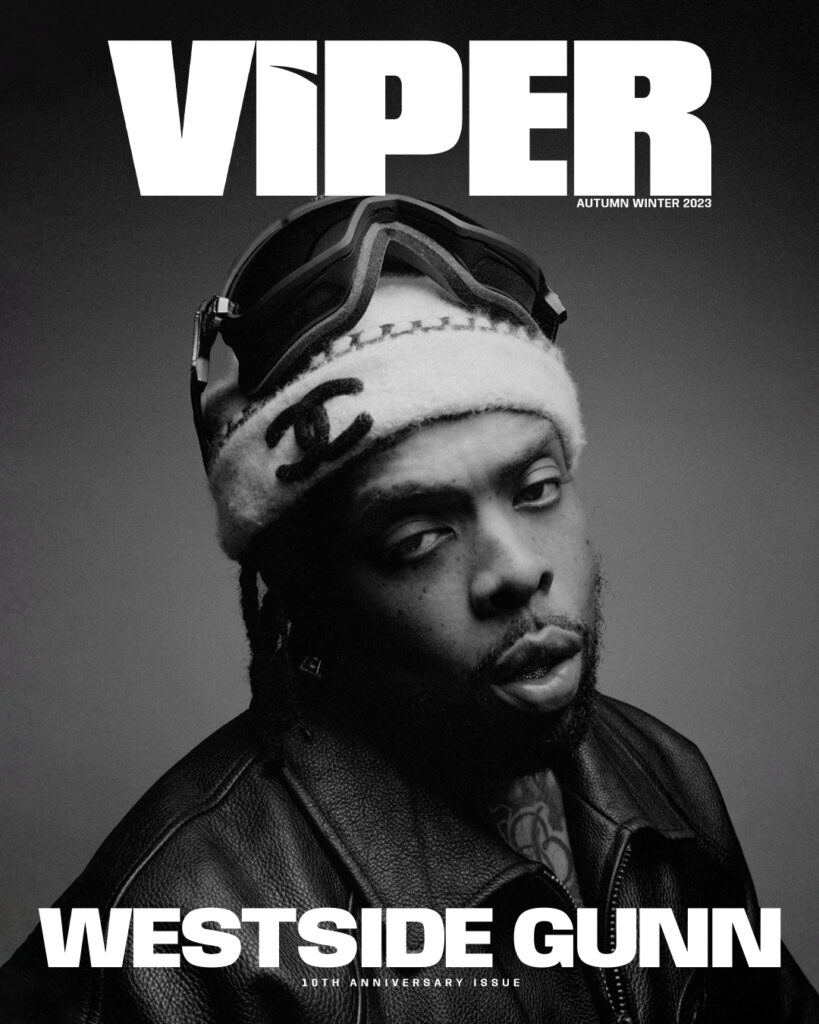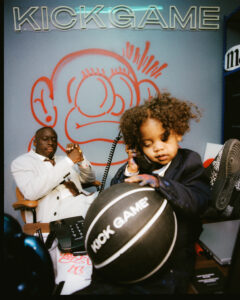Coops has been on the come up for a long time. From the genesis of his career and the highlight of opening up for hip-hop royalty, Nas, to the release of solo project Lost Soul, the North Londoner has churned out heartfelt and very real tales of self-doubt, spirituality and self-belief, going against the grain of much hip-hop emanating from the UK. His new release, God Complex, explores the same themes but in a way which shows a maturity beyond his years. This is music to bop your head to but also with a profound message of finding yourself in a world of temptation, injustice and, above all else, adversity.
Gifted doesn’t begin to describe Coops, but with his new mixtape, he has made a strong case for himself as one of the most exciting acts in the UK. We caught with the 22-year-old and chopped it up about all things God Complex.
So God Complex is out, what inspired the making of the album?
I feel the process, after making Lost Soul, was me asking myself what I’m going to do for the next step and how I’m going to show people that I’m here to stay. After Lost Soul, there were lots of people who were wondering if I was going to stick with the same sound or if I was going to come out with another body of work and I was quiet for a bit as well.
That was mainly a learning experience; I didn’t know what to expect with Lost Soul but after it came out it didn’t get the reception I thought it would in the sense that it was quiet. When someone put the full stream of the project on YouTube, within the first year it got 7000 hits and the next it went up to 126,000. That was me learning that people aren’t going to catch onto things straight away – word of mouth is what will spread it – and if you make it a good quality piece of work it will spread itself. But it took me a while to realise that so I was just kicking back, making music and I had God Complex ready but I found the anticipation for my next thing quite daunting.
But God Complex is about self-belief and my way of showing that I can make it, and you need that self-belief. As a musician, when I started, nobody listened to me so if I didn’t have the belief in my own talent I wouldn’t have continued, and that’s what inspired God Complex. It’s a steady progression but it’s not an album, unlike what people think. This was my next mixtape and its growth because the approach to the project was different and I grew as a person in between that so the content is more mature. I’m growing all the time and I’ll listen to something I recorded two weeks ago and think ‘why did I say that?’ but that’s the growth.
You talk a lot about spirituality throughout the project, would you say you’re a very spiritual person?
In the sense that I believe there is more to life than the physical. I’m not a religious person in that I don’t go to church or mosque or pray to a specific god but I do believe there is more to us than the physical, and there’s more to life than what we see now, here in front of us. Even because we only see things from certain lights and frequencies and sounds there is way more going on around us than we are not aware of. No one can tell us what happens after death either.
You are very introspective throughout the album, but would you call yourself a conscious rapper?
This word always gets to me, like I’m not sleeping, or I’m not knocked out! I’m here! But I’m conscious of my own actions and that, I suppose, makes me an introspective rapper and a self-analytical person and that’s what I choose to be in my music. But when I get told I’m a conscious rapper by comparison, I don’t know who you’re comparing me to. Is there someone lying on the floor while he’s spitting bars?
I don’t want to be boxed in because at the same time, I feel my music is representative of me and I have a duality to me. Everyone goes through positive and negative things and I want my music to portray that and that’s why I can’t just be conscious. I’m just talking me and my experiences. People can see that I’m trying to do something different to what I would call conscious rap, in the UK. But I get references like ‘conscious rap’, ‘boom bap’ and these little trigger words that piss me off. But as I grow more, people will understand what I’m here for.
What influenced you to tackle the subject matter you talk about?
Life influenced me, man. Like with Lost Soul, I would look around and it would just be self-commentary, and social commentary. Watching the world around me and my generation. With God Complex, it’s more of me and my journey as a musician and as a person, and what I’m experiencing. Things like self-doubt, self-belief, and that positive-negative duality that runs through the whole mixtape.
I’ve got a song on it called ‘Demons’ talking about my vices and my negative habits and how they become demons in your life. Then I’ve got ‘Most High’ where I’m questioning spirituality and what happens when we die – where do our souls go, and will I meet the most high or the devil? – all of these questions that I wanted to ask myself and see where it took me musically.
I felt ‘Dream Bigga’ was one of the most powerful and hard-hitting songs, how would you describe that song?
I don’t sit down and plan how I’m going to write a song, I just hear the beat and go. Whatever line you heard first on that song is probably what I started with and I pull the rest of the song together. But with ‘Dream Bigga’ I wanted it to be a hard hitting song and to talk to young black people and old black people. Everyone that has come from where I’m coming from and knows that we’re not moving the way we’re meant to be moving. We as black people need to unite and be more aware of what’s going on around us, and act upon it. So that song was basically a call to action.
Where did the concept for the video for ‘Frankincense and Myrrh’ come from?
Well the concept for the song was asking for the recognition for what I deserve and what I’m trying to do, because right now I don’t feel like I’m getting that. But also it was saying that some man are selling their souls and selling out themselves in the sense of not being true to themselves or the world around them.
For the video, the concept came from the director, Chas Appeti, and I asked how we could represent the selling of souls in a visual without it being too scary. He came up with the idea of there being a young kid who is seen as the reaper almost, and he’s going to have a jar and collect the souls of everyone who is going through turmoil. There’s a woman in the video who’s obviously going through a struggle and she is willing to do what she can to get out of the circumstances that they’re in.
You’re from North London, how would you describe it to someone who has never been?
It’s the melting pot, where different cultures come together. When I went to university in Southampton, coming from a place where minorities are the majority, and I was the only black boy in my class, and I fully understood what it meant to be from North London. There is such a mixing of culture and everyone is sharing ideas, food and other things, and that’s why there is so much music and art coming out of North London, and even South London where all of this mixing is happening.
But at the same time, as a young black boy growing up, you are victim to the injustices that people hear about, with the police and institutional racism and, because we are such a reserved country, it goes under the radar compared to America. We know how racist America is, but in England the same undertones are going on, with the EDL and Nigel Farage etc.
Which artist did you want to be most like when you were growing up?
Growing up I used to really like Bob Marley on another level. My mum used to listen to a lot of Bob Marley in the car, as well as Marvin Gaye and even Buena Vista Social Club; different music from all over the place. But Bob Marley stood out to me because of his message and how he managed to package it.
He would make sick songs and then I got to the age where I understood what he was saying and how powerful his message was and the effect he had on the planet – it changed the world – and that was very important to me, for his message and the way of life he promoted.
You’ve mentioned influences like Jay-Z, Eminem and A Tribe Called Quest as well, what did those guys in particular do for you?
Them man there were just barrers who knew how to package things right. When I listen to their albums that people say you should always go back to, like Reasonable Doubt, The Low End Theory, Beats, Rhymes & Life, Eminem’s Infinite, Nas’ Illmatic and all of these albums, they package them as stories and that is inspiring.
In England a lot of people don’t do that and aren’t putting that much creative thought into how they are going to package their work to the people, and it’s probably because times have changed from back then. Now, people want quick fixes and I feel we’re living in an era where people want quantity over quality, but the quality them man worked with is what I want to bring back.
You also opened up for Nas, what was that like?
That was my first ever live performance, at the o2 Arena in front of 7000 people; it was dope. I won a competition that was done by Choice FM (now Capital Xtra) where I sent them a video of me rapping for the chance to support Nas. I won by about 45%, I cleaned up! Nas is someone I look up to as a musician, but I wish I had the music I have now back then. It was so early in my career that the music wasn’t on the levels it is now and I could have done a lot more but it was all a stepping stone.
I performed ‘How Many Mics’ which was a Fugees cover, I performed an unreleased song called ‘Straight Out the Dungeons of Rap’ and a track called ‘Queen’s Head’ which I did for the competition. It sampled ‘Dead Presidents’ and that’s unreleased as well.
What do you think of the UK music scene?
It is on the come up, but I feel, these days, people are going with the crowd; if someone says something is sick then everyone else will think that too, but we haven’t got to the point where we’re really discovering talent, we’re just going off what the plug is saying. If Noisey is plugging someone then it must be sick and it means they stand out of the UK artists that they can push to America or wherever.
But all I can really say is that the scene is growing, and grime is the perfect example. Grime was about, then it died out and then the youth revitalised it, which then inspired the older generation to go back and take control. I think the same thing is going to happen with UK hip-hop; just like with people like Blak Twang and Skinnyman, you can now go on SBTV and find me and other guys who are trying to bring back that golden era of hip-hop.
I was talking to someone the other day and said grime couldn’t pop in America before because you had people like 50 Cent bossing the clubs, with different tempos. But then with trap, the pace was picked up in America more to grime’s tempo and people were ready to feel it now. People here are going to get used to artists making hip-hop rather than grime and a scene for that is going to be built much like the grime scene.
So, you believe the grime scene died?
Yeah, because the grime scene tried to commercialise itself. Because labels saw them and thought they were popping and they have a following, so thought how can we capitalize off that. They started signing guys and tried to push them to wider markets which changed the sound of their music and it got to the stage where people were saying that so-and-so sold out, so-and-so makes pop music.
It benefitted the grime scene because it opened it up to the masses, but I say it died because grime as we see it today died for a while and almost became pop music. But eventually, everybody came back home and back to basics and back to their own blueprints.
What are your plans for the rest of the year now that God Complex is out?
To be 1000 times more consistent than previously. You need to keep yourself relevant and be in people’s faces, because hard work beats talent at the end of the day. That’s what I intend to do this year; no breaks, consistent with my content and allowing people to see who I am a lot more. I’m not someone who gives off a lot apart from my music being very self-analytical, but people don’t know who I am. But I just want to remain relevant with my content.
What would you say is the proudest moment of your career so far?
Probably getting Lost Soul on vinyl. A German record label, Vinyl Digital, contacted us and loved the album and wanted to press it onto vinyl. There were 300 copies and it sold out really quickly as well, which was dope.
How do you think you have grown as an artist since your debut?
Just by growing as a person, and I feel my music is a reflection of who I am, and I try to keep my music as true to who I am at the time, as I can, and I think that’s going to allow me to have an endless flow of material. That’s the most important thing to me.
Interview by Yemi Abiade.




